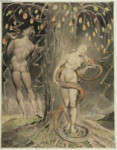This year marks the 200th anniversary of one of my favorite books - Mary Shelley's Frankenstein. Actually, its full title is Frankenstein: Or the Modern Prometheus. And that is a good reminder that this novel is really about Frankenstein the man, not about his creation. Frankenstein is the one who steals from the gods (God?) the ability to create life from that which is lifeless. And, as long as we are clearing up misconceptions, the novel is not about re-animating the dead, as is often popularly shown in the movies, … [Read more...] about Book Review: Frankenstein
the fall
Faith and Reason, Part 2: Augustine
Frequent ESN contributor and Graduate & Faculty Ministries Staff Mark Hansard returns with Part 2 of a summer series on faith and reason. As you may remember, Part 1 took a brief look at a Scriptural basis for using reason and logic. We're always happy to share Mark's thoughtful writings. Interested in reading more by Mark? You can explore his thoughts on learning about godly scholarships through Hebrews, his popular posts on The Fruit of the Spirit in Academia, or all of his literary and theological … [Read more...] about Faith and Reason, Part 2: Augustine
Imago Dei: Vision and Value (Part 4 of 5)
Michael Huerter continues his series responding to The Image of God in an Image Driven Age: Explorations in Theological Anthropology, edited by Beth Felker Jones and Jeffrey W. Barbeau (Downers Grove, IL: InterVarsity Press, 2016). See Part 1 of Michael's explorations here, Part 2 here, and Part 3 here. Whether we think of the image of God as being related to human beings' unique rationality, their place as representatives of God's reign, their potential for relationships, or their ability to make moral choices, … [Read more...] about Imago Dei: Vision and Value (Part 4 of 5)
A Response to Overnaming
In this four-part series, I aim to think about one particular aspect of language: naming. In the introduction, I preliminarily addressed the root of the problem, the Fall. In the second post, I argued the “knowledge of good and evil” we gained at the Fall became the way we separate ourselves from God. We never gained this knowledge as if it was information about good and evil. We instead changed our relationship with naming. Here I want to begin to think through a general response. In the fourth, we will tackle … [Read more...] about A Response to Overnaming
Overnaming as The Fall
In this four-part series, I aim to think about one particular aspect of language: naming. In the introduction, I preliminarily addressed the root of the problem, the Fall. In this post I want to dive deeper into the original ‘scene of the crime' for clues toward the character of the relationship between language and naming. … [Read more...] about Overnaming as The Fall




